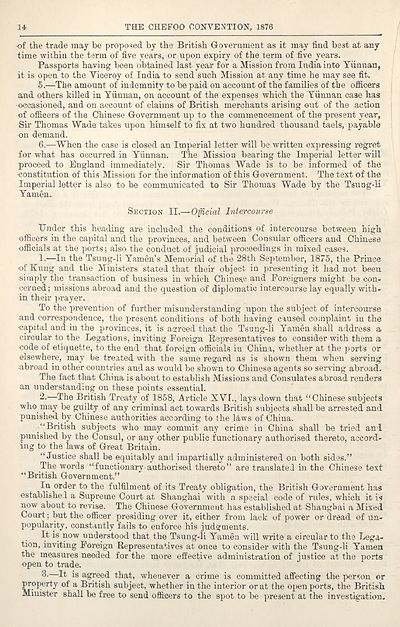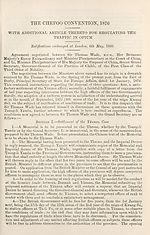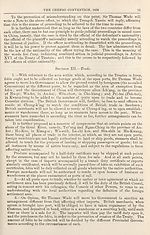1917
(94) Page 14
Download files
Complete book:
Individual page:
Thumbnail gallery: Grid view | List view

14
THE CHEFOO CONVENTION, 1876
of the trade may be proposed by the British Government as it may find best at any
time within the term of five years, or upon expiry of the term of five years.
Passports having been obtained last year for a Mission from India into Yunnan,
it is open to the Viceroy of India to send such Mission at any time he may see fit.
5. —The amount of indemnity to be paid on account of the families of the officers
and others killed in Yunnan, on account of the expenses which the Yunnan case has
-occasioned, and on account of claims of British merchants arising out of the action
of officers of the Chinese Government up to the commencement of the present year.
Sir Thomas Wade takes upon himself to fix at two hundred thousand taels, payable
on demand.
6. —"When the case is closed an Imperial letter will be written expressing regret
for what has occurred in Yunnan. The Mission bearing the Imperial letter will
proceed to England immediately. Sir Thomas Wade is to be informed of the
-constitution of this Mission for the information of this Government. The text of the
Imperial letter is also to be communicated to Sir Thomas Wade by the Tsung-li
Yamen.
Section II.—Official Intercourse
Under this heading are included the conditions of intercourse between high
officers in the capital and the provinces, and between Consular officers and Chinese
officials at the ports; also the conduct of judicial proceedings in mixed cases.
1. —In the Tsung-li Yamen’s Memorial of the 28th September, 1875, the Prince
•of Kung and the Ministers stated that their object in presenting it had not been
simply the transaction of business in which Chinese and Foreigners might be con¬
cerned; missions abroad and the question of diplomatic intercourse lay equally with¬
in their prayer.
To the prevention of further misunderstanding upon the subject of intercourse
and correspondence, the present conditions of both having caused complaint in the
•capital and in the provinces, it is agreed that the Tsung-li Yamen shall address a
circular to the Legations, inviting Foreign Representatives to consider with them a
code of etiquette, to the end that foreign officials in China, whether at the ports or
elsewhere, may be treated with the same regard as is shown them when serving
abroad in other countries and as would be shown to Chinese agents so serving abroad.
The fact that China is about to establish Missions and Consulates abroad renders
an understanding on these points essential.
2. —The British Treaty of 1858, Article XV1., lays down that “Chinese subjects
who may be guilty of any criminal act towards British subjects shall be arrested and
punished by Chinese authorities according to the l&ws of China.
.“British subjects who may commit any crime in China shall be tried and
punished by the Consul, or any other public functionary authorised thereto, accord¬
ing to the laws of Great Britain.
“Justice shall be equitably and impartially administered on both sides.”
The words “functionary authorised thereto” are translated in the Chinese text
“British Government.”
In order to the fulfilment of its Treaty obligation, the British Government has
established a Supreme Court at Shanghai with a special code of rules, which it is
now about to revise. The Chinese Government has established at Shanghai a Mixed
Court; but the officer presiding over it, either from lack of power or dread of un¬
popularity, constantly fails to enforce his judgments.
It is now understood that the Tsung-li Yamen will write a circular to the Lega¬
tion, inviting Foreign Representatives at once to consider with the Tsung-li Yamen
the measures needed for the more effective administration of justice at the ports
open to trade.
3- It is agreed that, whenever a crime is committed affecting the person or
property of a British subject, whether in the interior or at the open ports, the British
Minister shall be free to send officers to the spot to be present at the investigation.
THE CHEFOO CONVENTION, 1876
of the trade may be proposed by the British Government as it may find best at any
time within the term of five years, or upon expiry of the term of five years.
Passports having been obtained last year for a Mission from India into Yunnan,
it is open to the Viceroy of India to send such Mission at any time he may see fit.
5. —The amount of indemnity to be paid on account of the families of the officers
and others killed in Yunnan, on account of the expenses which the Yunnan case has
-occasioned, and on account of claims of British merchants arising out of the action
of officers of the Chinese Government up to the commencement of the present year.
Sir Thomas Wade takes upon himself to fix at two hundred thousand taels, payable
on demand.
6. —"When the case is closed an Imperial letter will be written expressing regret
for what has occurred in Yunnan. The Mission bearing the Imperial letter will
proceed to England immediately. Sir Thomas Wade is to be informed of the
-constitution of this Mission for the information of this Government. The text of the
Imperial letter is also to be communicated to Sir Thomas Wade by the Tsung-li
Yamen.
Section II.—Official Intercourse
Under this heading are included the conditions of intercourse between high
officers in the capital and the provinces, and between Consular officers and Chinese
officials at the ports; also the conduct of judicial proceedings in mixed cases.
1. —In the Tsung-li Yamen’s Memorial of the 28th September, 1875, the Prince
•of Kung and the Ministers stated that their object in presenting it had not been
simply the transaction of business in which Chinese and Foreigners might be con¬
cerned; missions abroad and the question of diplomatic intercourse lay equally with¬
in their prayer.
To the prevention of further misunderstanding upon the subject of intercourse
and correspondence, the present conditions of both having caused complaint in the
•capital and in the provinces, it is agreed that the Tsung-li Yamen shall address a
circular to the Legations, inviting Foreign Representatives to consider with them a
code of etiquette, to the end that foreign officials in China, whether at the ports or
elsewhere, may be treated with the same regard as is shown them when serving
abroad in other countries and as would be shown to Chinese agents so serving abroad.
The fact that China is about to establish Missions and Consulates abroad renders
an understanding on these points essential.
2. —The British Treaty of 1858, Article XV1., lays down that “Chinese subjects
who may be guilty of any criminal act towards British subjects shall be arrested and
punished by Chinese authorities according to the l&ws of China.
.“British subjects who may commit any crime in China shall be tried and
punished by the Consul, or any other public functionary authorised thereto, accord¬
ing to the laws of Great Britain.
“Justice shall be equitably and impartially administered on both sides.”
The words “functionary authorised thereto” are translated in the Chinese text
“British Government.”
In order to the fulfilment of its Treaty obligation, the British Government has
established a Supreme Court at Shanghai with a special code of rules, which it is
now about to revise. The Chinese Government has established at Shanghai a Mixed
Court; but the officer presiding over it, either from lack of power or dread of un¬
popularity, constantly fails to enforce his judgments.
It is now understood that the Tsung-li Yamen will write a circular to the Lega¬
tion, inviting Foreign Representatives at once to consider with the Tsung-li Yamen
the measures needed for the more effective administration of justice at the ports
open to trade.
3- It is agreed that, whenever a crime is committed affecting the person or
property of a British subject, whether in the interior or at the open ports, the British
Minister shall be free to send officers to the spot to be present at the investigation.
Set display mode to:
![]() Universal Viewer |
Universal Viewer | ![]() Mirador |
Large image | Transcription
Mirador |
Large image | Transcription
Images and transcriptions on this page, including medium image downloads, may be used under the Creative Commons Attribution 4.0 International Licence unless otherwise stated. ![]()
| Asian directories and chronicles > 1917 > (94) Page 14 |
|---|
| Permanent URL | https://digital.nls.uk/194533530 |
|---|
| Attribution and copyright: |
|
|---|---|
| Description | Volumes from the Asian 'Directory and Chronicle' series covering 1917-1941, but missing 1919 and 1923. Compiled annually from a multiplicity of local sources and research. They provide listings of each country's active corporations, foreign residents and government agencies of all nationalities for that year, together with their addresses. Content includes: various treaties; coverage of conflicts; currencies and taxes; consular fees; weights and measures; public holidays; festivals and traditions. A source of information for both Western states and communities of foreigners living in Asia. Published by Hongkong Daily Press. |
|---|---|
| Shelfmark | H3.86.1303 |
| Additional NLS resources: |

